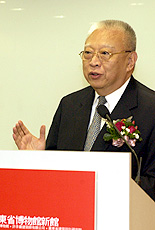
|
| Huge potential: Chief Executive Tung Chee Hwa says CEPA's real power will not be fully realised until our service sectors have become established on the Mainland. |
CEPA has proved itself a major driver of our economy, but its real power will not be fully realised until our service sectors have become established in the Mainland market.
This was the message from Chief Executive Tung Chee Hwa, speaking at the contract-signing ceremony for the design of the new Guangdong Museum project today.
Mr Tung said since signing CEPA in June last year, Hong Kong has been exploring with the Central Government ways of deepening and broadening the scope of co-operation between the two sides within the framework of the arrangement.
"Our efforts have paid off with the signing of the agreement of co-operation for the second phase of the implementation of CEPA last week," he said.
Preferential treatment
Under the deal, the Mainland has agreed to grant preferential treatment to Hong Kong enterprises in eight new service areas. And for 11 of the 18 service sectors that already receive preferential treatment, restrictions will be further liberalised. These include legal, construction and medical services.
"We will strive to push forward with the new phases of CEPA to strengthen the further development and co-operation in professional service sectors. I have every confidence that with the speedy implementation of CEPA, our professionals will enjoy greater convenience, opportunities and prospects on the Mainland," he said.
Hong Kong is Guangdong's closest partner in economic co-operation, he said, adding today's signing will forge closer ties.
The Guangdong Museum is one of the province's three landmark cultural facilities. Upon its completion in three years, it will become a key feature of Guangzhou's new cultural zone.
Hong Kong's Rocco Design beat world-class competitors from Europe, the US, Japan and the Mainland with its winning design.
|